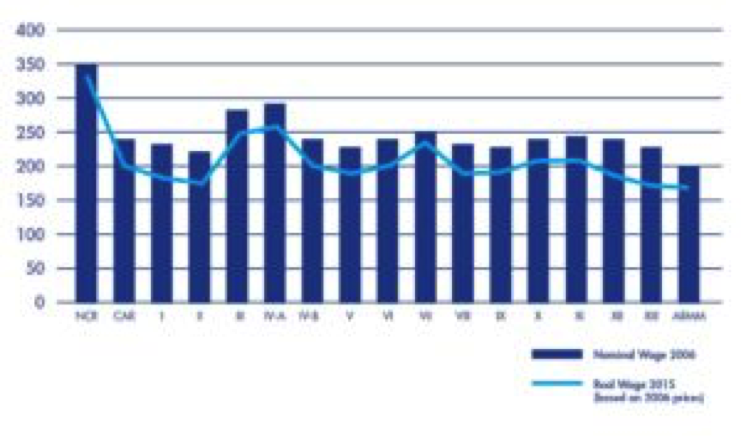Labor Rights Group Decries Zero Wage Hike; Challenges PNoy Gov’t, Walk Your Talk In Your Final Month In Office

“Amidst the loud noise of election frenzy and heaps of promises of lifting the poor out of poverty if Daang Matuwid will continue, PNoy could make at least even a word true by granting the workers significant wage hike this Labor Day. Instead, his government gives P7.00 to workers in Central Luzon only, too little even for an alms to workers whose lives became poorer under his 6-years administration,” Daisy Arago, Executive Director of labor rights NGO, Center for Trade Union and Human Rights commented on DOLE wage hike announcement.
On April 20, the Department of Labor and Employment announced that it is unlikely that wage hikes will be approved before May 1 because petitions of wage hikes still need to undergo hearing. On Monday, April 25, DOLE approved a 7-peso wage hike in Central Luzon and P45 pesos in Cagayan Valley.
“When you hear the lines, ‘gumanda na ang buhay natin, hahayaan pa bang mahinto’ (our lives are better now, are we going to let this end), all lies and well-rehearsed election statements that PNoy himself and his chosen candidates are peddling in election sorties and massive election ads, P7 wage increase for workers in Central Luzon is like stabbing you right on your chest, and yet asking you for support when you survived,” Arago added.
The group said that even the P45 wage hike for workers in Cagayan Valley, will not make a dent in workers’ pocket. The current wage in Region II is only P255, barely enough even for an individual to survive.
“Zero wage increase for most workers is even worse. It is replete of heartlessness and insensitivity, that this government wants the voters to hide in their eloquent election propaganda,” Arago said.
The group observed that real wages in various regions across the country is way below 2006 wage levels as increases in wage rates in the six year term of Aquino administration are nothing but crumbs (See graph).
“Real wages are falling and the government should know this very well. Yet workers’ demand for significant wage hikes has been shunned by the Aquino administration in the last six years resulting in a much wider wage gap. It has become more and more difficult for the Filipino workers to afford a decent living under Aquino,” Arago added.
According to a study by Ibon Foundation, gap between the minimum wage and the family living wage increased from P535 in 2009 to P608 in 2016.
“Not only does the Aquino government hide this reality but it also keeps labor cheaper by imposing policies like the two-tier wage system that sets wage levels based on the poverty threshold of P46 a day. I wonder, has any of the PNoy’s men and women ever lived on P46/day?” Arago averred.
Arago further pointed out that the Aquino administration has peddled Filipino labor on a very cheap rate hoping that investors and business will come while Filipino workers and their families try miserably to make ends meet in order to survive.
The group also urged the government and whoever will succeed Aquino to consider repealing the wage rationalization law, and replace it with a national minimum wage rate that is closer to the living wage.
“A national minimum wage applied to all workers is only just. It paves way some level of equality, even at the level of wages. Afterall, every worker eat rice and some viands, wherein prices are very much the same and at times more expensive in places outside the metropolis,” Arago explained.
Ending contractualization?
Meanwhile, CTUHR appreciates the presidential candidates’ statements on ending contractualization. The group says it is a recognition of the immensity of the problem that contractualization brings to workers, their families and even to society. But the group also expressed doubts whether any of the presidentiables can actually “end contractualization” if they will continue to espouse neoliberal economic policies.
“Ending contractualization goes beyond legislation and enforcement, but it could serve well if DO 18-A is immediately repealed and if penalties or criminal charges are imposed on companies, enterprises that will continually practice contractualization, when a new President takes office. By taking these actions, the new President can very well help restore dignity in work,” Arago explained.###
